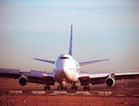World-First Study For Cleaner Aviation Fuel

Called the Sustainable Aviation Fuels Road Map, the study aims to accelerate the development and commercialisation of a sustainable aviation fuels industry in Australia and New Zealand.
The project has developed in collaboration with the Australasian section of the Sustainable Aviation Fuel Users Group (SAFUG) – including Air New Zealand, Boeing, Qantas and Virgin Blue – together with the Defence Science and Technology Organisation (DSTO). A full list of road map participants is available below.
Aviation accounts for 2 per cent of the world's total greenhouse gas emissions. Cleaner jet fuels derived from plant matter (known as bio-oil) offer the largest single opportunity to reduce emissions while ensuring long-term fuel security for the sector.
The road map will examine the barriers, opportunities and implications of producing bio-derived jet fuels at scale, including: commercial viability; environmental sustainability; and alternative biomass feedstocks (such as algae and more traditional forest and agricultural products) for producing aviation biofuels in the Australasian climate and region.
Aviation is fundamental to the Australian economy and way of life. The tourism industry alone creates jobs for half a million Australians and contributes billions of dollars to our economy.
CSIRO Energy Transformed Flagship's chief economist and road map project leader Mr Paul Graham said:
"The issue is whether we can produce a cost-effective bio-derived jet fuel alternative to fossil fuels that doesn't have any detrimental impacts on the environment or social make-up of regional Australia," Mr Graham said.
"Over the coming months we're expecting some healthy debate among participants that will result in the development of a diverse set of scenarios for Australia and New Zealand's aviation fuel future."
The Sustainable Aviation Fuels Road Map gathers an impressive and diverse group of participants from the aviation, science and technology, government and non-government sectors bringing a wealth of experience and many different perspectives relating to the aviation industry.
The study will draw on the expertise of participants and use sophisticated economic modelling to map out future scenarios. It is intended to provide useful input to decision makers in industry and government on strategic policy and future investment, through the release of a public report in September 2010.
Participants in the Sustainable Aviation Fuels Road Map include: Air New Zealand; Boeing; Qantas; Virgin Blue; Defence Science and Technology Organisation; Airbus; Australian Defence Force; Brisbane Airport Corporation; Bioenergy Association of New Zealand; Biofuels Association of Australia; GE; Honeywell UOP; New South Wales Office of Biofuels; Pratt & Whitney; Queensland Department of Employment, Economic Development and Innovation; Rolls-Royce; Royal Aeronautical Society Australian Division; South Australian Department of Premier & Cabinet; The Climate Group; Victorian
Department of Innovation and Regional Development; and WWF.
The project will also engage international observers and presenters such as the Roundtable on Sustainable Biofuels and Cathay Pacific.
CSIRO initiated the National Research Flagships to provide science-based solutions in response to Australia's major research challenges and opportunities. The 10 Flagships form multidisciplinary teams with industry and the research community to deliver impact and benefits for Australia.
SOURCE: CSIRO
